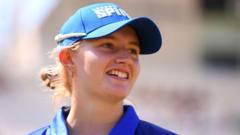Why I Choose Moms for My Team Despite Judgment for Wanting Kids

Understanding the Fertility Journey of Athletes: Chelsea Pitman’s Story
In the world of sports, discussions surrounding fertility and motherhood have often been shrouded in silence. However, athletes like Chelsea Pitman are bravely shedding light on these topics, sharing their personal experiences to foster a culture of openness and support. As the head coach of Nottingham Forest netball, Pitman has encountered her share of challenges on her journey to motherhood, including multiple miscarriages. Her story is not just a personal account; it is a call to action for the sporting community to embrace and support the aspirations of athletes who wish to become mothers.
Breaking the Silence on Miscarriage
Miscarriage is a heart-wrenching experience that many women face, yet it remains a topic that is rarely discussed openly. Chelsea Pitman’s experiences highlight the emotional toll that such losses can take, particularly for someone in the public eye. She emphasizes that sharing her story is vital in helping others feel less isolated in their struggles. Pitman reflects on her own journey, stating, "I want to be a mum more than anything, but it's just not on the cards for me." This raw honesty resonates with many, providing a sense of solidarity and understanding.
The Emotional Impact of Miscarriage
The emotional repercussions of miscarriage can be profound and lasting. For athletes like Pitman, who have dedicated their lives to physical excellence, the notion of their bodies failing them can be particularly difficult to grapple with. She recalls moments of self-doubt and questioning her body’s capabilities, stating, "My body allowed me to achieve everything in netball, but it hasn't allowed me to achieve the one thing that I really wanted." This sentiment is common among women who experience reproductive challenges, highlighting the intersection between physical performance and personal aspirations.
Changing Attitudes in Sports
Historically, the conversation around motherhood in elite sports has been fraught with stigma. Pitman recalls a time when the prospect of pregnancy could jeopardize a player’s career. "You'd be judged by it, or if it came to contracts or recruitment, that's going to be at the forefront of coaches' minds," she explains. This fear of being penalized for wanting to start a family has led many athletes to keep their desires and experiences hidden.
Creating a Supportive Environment
As a head coach, Pitman aims to create a culture that welcomes discussions about motherhood. She asserts that athletes should not have to choose between their professional careers and their personal desires to become parents. "If you want to be a mum, that's amazing. But I want you as an athlete, and you're not pregnant now – so come, I don't care," she encourages. This progressive attitude is essential in fostering an environment where athletes feel supported in their choices.
The Role of Sports Organizations
One of the critical elements in supporting athletic mothers is the role that sports organizations can play. Pitman recognizes that while some sports are making strides in this area – such as the WTA Tour’s initiatives for maternity leave and the protection of rankings for players freezing eggs – netball still has a long way to go. "Realistically, netball lacks the necessary financial resources," she states. The semi-professional status of the Super League limits the ability to offer comprehensive support to players pursuing motherhood.
Advocating for Change
The onus of change lies not just on athletes but also on sports organizations. By implementing policies that support maternity leave and fertility options, sports can create an environment where athletes can thrive both personally and professionally. Pitman’s hope is that the netball community will evolve to support its players better, allowing them to pursue their dreams of motherhood without fear of repercussions.
Empowering Athletes to Share Their Stories
One of the most powerful aspects of Chelsea Pitman’s journey is her commitment to encouraging others to share their own experiences. After opening up about her miscarriages, she was met with an outpouring of support from fellow athletes who had faced similar challenges. "I was like, 'why do we keep this quiet?'" she recalls. By fostering a culture of openness, athletes can help dismantle the stigma surrounding miscarriage and motherhood in sports.
Finding Solidarity in Shared Experiences
When athletes share their stories, they create a sense of community that can be incredibly healing. Pitman notes that many women felt empowered to share their own experiences after hearing hers. This solidarity is crucial for breaking the cycle of silence that often surrounds issues of fertility and motherhood. By speaking out, athletes can inspire one another, turning personal pain into collective strength.
Looking Ahead: The Future of Motherhood in Sports
As Pitman reflects on her journey, she acknowledges the uncertainty of the future. While she expresses hope that her dreams of motherhood may still come true, she also emphasizes the importance of living in the moment and prioritizing happiness. "Life's too short," she states. "You're old for a long period of time, so do whatever makes you happy." This message resonates deeply, reminding athletes that their well-being should take precedence over societal expectations.
Encouraging Future Generations
Pitman’s commitment to supporting future generations of athletes extends beyond her personal experiences. By advocating for a more inclusive and nurturing environment in netball, she hopes to inspire the next wave of athletes to pursue their dreams of both career and motherhood. Her vision includes a future where aspiring mothers are met with encouragement rather than judgment.
Conclusion: A Call to Action for Change
Chelsea Pitman’s experiences as a netball athlete and coach highlight the need for greater openness and support surrounding motherhood in sports. Through her courage in sharing her story, she paves the way for other athletes to feel empowered to speak about their own journeys. As the sporting world evolves, it is crucial to embrace policies that support athletes who wish to become mothers, ensuring they do not have to choose between their dreams and their personal aspirations.
The dialogue surrounding motherhood in sports is changing, but there is still work to be done. It is time for sports organizations, coaches, and athletes alike to come together to create a more supportive environment for all. As we move forward, let us celebrate the diversity of experiences and recognize the strength that comes from unity and shared understanding.
FAQs
What challenges do female athletes face regarding motherhood?
Female athletes often face challenges such as lack of support from sports organizations, fear of judgment regarding their career choices, and limited access to maternity benefits. These factors can make it difficult for them to balance their professional and personal aspirations.
How can sports organizations support athlete mothers?
Sports organizations can support athlete mothers by implementing maternity leave policies, providing fertility options, and fostering a culture of openness regarding motherhood. This support can help athletes feel secure in their choices to start families while pursuing their careers.
Why is it important for athletes to share their stories about fertility?
Sharing stories about fertility can help to break the stigma surrounding these issues, creating solidarity among athletes. Open discussions can empower others to share their experiences, fostering a supportive community that can help individuals navigate their challenges.
As we reflect on the journey of female athletes like Chelsea Pitman, it’s essential to consider how we can contribute to a culture that embraces motherhood in sports. What steps can you take to support this movement? #AthleteMothers #FertilityAwareness #SportsCulture
Published: 2025-06-25 09:49:11 | Category: sport



